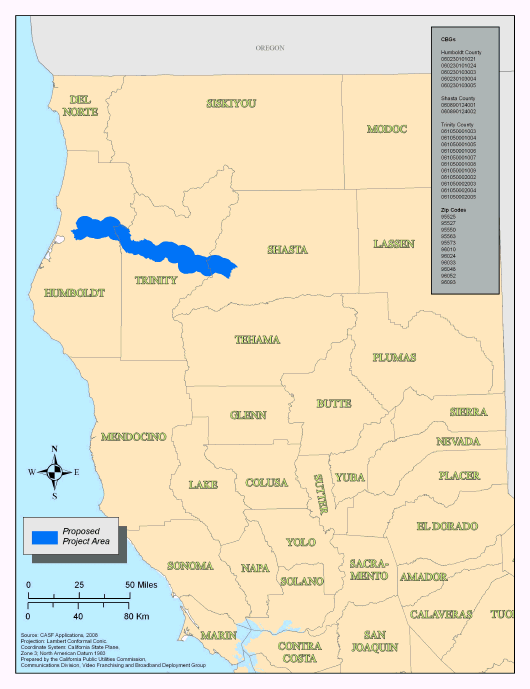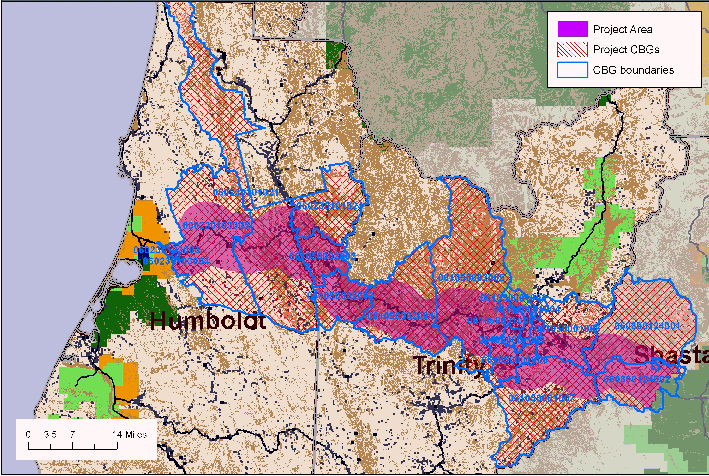by Bob | Feb 5, 2009 | Broadband/Internet, Local Tech Notes
The RTC luncheon on Monday was a great success. Erin Tracy from the Times-Standard did a good recap, and Ryan Burns from the Northcoast Journal has provided some nice personal details to fill out some of the atmospherics, including a little showdown between Mwichale Brinskele, CEO of Broadband Associates and Mike Ireton, owner of a wireless internet service provider (WISP) basee in Willits.
Neither reporter addressed a couple issues I’d like to bring up.
We had a good turn out that included the 2 newest members of the Humboldt County Board of Supervisors, Mark Lovelace and Clif Clendenen. What happened to the other 3? Broadband issues are vital to the regional economy and safety of the region. Are the other Supes not interested?
The financial viability of the Broadband Associates project has brought up, although not directly at the luncheon. One of the stumbling blocks for the much ballyhooed IP Networks fiber project that was supposed use the Highway 36 route has been the reluctance of major tenants such as Suddenlink, CENIC or even AT&T to sign on to use the line. So I asked Marie Bianco from Broadband Associates how dependent their plan is on getting thes major incumbent ISPs to commit to using their new line. She assured me that they have business cases that work with or without their commitment upfront. But it’s hard to imagine an $18 million fiber line being supported by a few hundred, or even a few thousand wireless subscribers. So, it seems that they must believe once they begin to complete sections of the line, once they start to light up fiber, these major players will be ready to sign up. But that’s a big gamble their investors have to be willing to take.
On the other hand, from what I hear the IP Networks line is still in the works. And there may be others trying to bring service to our area. If so, why? What is the true market value of broadband demand in our area?
I just hope one of them succeeds.
by Bob | Jan 23, 2009 | Broadband/Internet, Local Tech Notes
Those of us who already have high speed access have a tendency to get complacent about broadband issues until the next fiber break happens. But some have been working diligently to find ways to improve our telecommunications infrastructure, not waiting for the next disaster and knowing many areas of the region remain un-served or under served. In one fell swoop, one project may solve many of these issues. The California Public Utilities Commission appears prepared to award over $7 million to a company called Broadband Associates through the California Advanced Services Fund to build a second fiber line from I – 5 to Eureka along the Highway 299 corridor.
Other proposed projects such as the IP Networks was working on in conjunction with PG&E have not come to fruition. That project would have used PG&E towers closer to much less populated Highway 36 corridor and, as far as I know made no provisions for access point along the way. The 299 route is more difficult and more expensive but the project includes access for wireless providers to service communities from Blue Lake to Weaverville.
There has been some strong opinions expressed on the RTC mailing list about the wisdom and viability of this project and why we haven’t heard much about it until just now. I think many of the concerns over transparency and accountability should be address to the CPUC itself.
Yesterday I spoke with Michael Brinskele, CEO of Broadband Associates about their proposal. Michael has had an interest in our region for quite a while. He attended the last Broadband Forum and has been in discussion with CENIC and people from Redwood Coast Connect. Their application for the CASF funds has come after looking carefully at the region’s issues and opportunities.
From our conversation I felt he is quite aware of the challenges such a project holds both for the build itself and its economic viability. He believes Broadband Associates has a strong business plan to make this work. However, since there is still a great deal of planning to do before the February 20 deadline they are purposively not making any public noise about this project in order to not raise expectations or over promise. On the other hand he is pleased there is great interest in this project and has expressed to me an openness to any questions or concerns from people who would like to learn more. Those questions can be addressed to info@broadbandassoc.com. 

by Bob | Jan 20, 2009 | Broadband/Internet, Local Tech Notes
The Redwood Technology Consortium is trying some new things this year as the result of polling our community and talking to people about what is most useful. Instead of monthly meetings we will be offering a seires of luncheons with panels on variousl topics. The first luncheon will be held February 2, 12-2 PM at the Plaza Grill in Arcata. People from Redwood Coast Connect will be discussing the final report which will be released around that time. Given the comments the project has engendered on the RTC Discussion list and the proposed policy changes at the national, state and local levels regarding telcommunications and broadband, this should prove a lively event. Reservations can be made online.
On March 14, RTC is planning a Tech Conference. This intended to be a more focused event that the old Tech Expo RTC used to host each year. The focus will be on skill development and showcasing tech innovations. While a few things such as at least for hours of training in online marketing, RTC is currently accepting proposals for presentations. This is a chance for local technology experts to share innovations and expertise in a variety of areas. The First Annual Northcoast Technology Conference will be held at the Humboldt Bay Aquatic Center.
by Bob | Aug 21, 2008 | Local Tech Notes
If you’re interested in viewing a live stream of Broadband Forum IV you can catch it here. I’m in the room, so my sound is turned off. But I understand the sound on the feed is not so good.
by Bob | Aug 20, 2008 | Local Tech Notes
Tomorrow is Broadband Forum IV at Fortuna’s River Lodge. Redwood Coast Connect should be presenting the results of their assessment of broadband deployment in the region and plans for increasing that to more rural areas. In advance of that the Eureka Reporter’s Ashley Bailey has published part 1 of a 2 part series on the issue. It will be interesting to see what RCC comes up with beyond what most in the rural areas alread know: Broadband is typically either not available or not reliable. So what solutions will RCC and others at Broadband Forum IV tell us? Hoopa’s Connie Davis, as quoted in the article says, “I think it’s something you need to have in this day and age. We don’t need to do studies. We don’t need to talk about this. We just need to do it because we need it.†Part 2 of Ashely’s series will appear in the paper tomorrow.
In the meantime as USAToday reports, FCC Chairman Kevin Martin is also concerned about boltering broadband deployment, particularly to rural areas. ” ‘More and more people expect and demand to have access to the Internet and new wireless technologies,’ Martin says. ‘It is important that the (FCC) try to find new ways to address’ those needs. The way Martin sees it, broadband is quickly becoming what copper phone lines were for decades: the main means of communication for millions of Americans.” Martin is proposing to use a portion of the wireless spectrum to help fill in the holes in rural areas. He would like to see use of the federally subsidized universal service fund to help pay for this. He faces opposition from wireless carriers on use of the wireless spectrum and from rural phone companies on use of the universal service fund.


